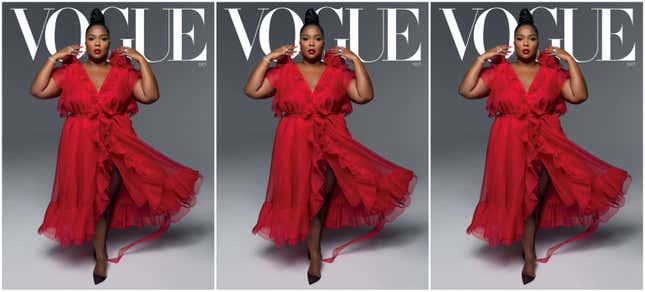
She’s bumped up the “Tempo,” brought the “Juice,” and keeps us feeling “Good as Hell” even when the “Truth Hurts.” Now, Lizzo is bringing her luscious brand of self-love where few if any Black women over a size 6 have gone before: to the cover of Vogue’s October issue.
None other than veteran video and film director Hype Williams captures Lizzo—dressed in Valentino, Moschino Couture, Gucci, and LaQuan Smith—for the issue, while erstwhile fan and award-winning writer Claudia Rankine pens the cover story, writing:
Lizzo is the kind of artist who speaks to multitudes because—in an era of fake news and lying politicians and stressed-out white Americans shouting racist words at stressed-out people of color—she was committed to positivity. This despite the trolls going after her for her race, her weight, her sexuality. Anyone who could understand what it was like to be targeted felt spoken to by Lizzo. They were seen by Lizzo and were taking her lead to love themselves a little bit harder.
In Lizzo’s own words, she’s simply “a Black woman making music from a Black experience”—albeit one with a recently announced first-look deal with Amazon Studios (h/t Variety). But if she’s built her brand on reliability, it’s because she says things we’re all feeling, especially in a tumultuous year like this one:
“There are so many levels to the butterfly effect of this pandemic,” she tells Rankine, “not just the sickness but the emotional and mental effects. That is what keeps me up at night. And that’s what stresses me out.”
Ironically, that’s also where Lizzo comes in. “I want to make music that helps,” she says. “‘Cause that’s the way that I help. I’m not a doctor, I’m not a lawyer, I don’t work in the government. I make music.”
One of her idols-turned-collaborator and friend Missy Elliott describes Lizzo’s music as “empowering, liberating, and fun…with a side order of ratchet sauce...She shows the world what strength and perseverance look like.” Like Missy, Lizzo didn’t fit the prototype of a music star with “crossover appeal,” and says it’s the hip hop pioneer, along with Queen Latifah, who inspired her to dream bigger in an industry that traditionally prefers its icons smaller, as both were “women who looked like me and who were successful in the ways I wanted to be successful,” she says. “I was like, ‘Okay. I can be confident and look this way.’ You know?”
Lizzo may seem a poster child for the body positivity movement, but she casts an equally critical lens on who actually benefits from it, telling Rankine, “I think it’s lazy for me to just say I’m body positive at this point...It’s easy. I would like to be body-normative. I want to normalize my body. And not just be like, ‘Ooh, look at this cool movement. Being fat is body positive.’ No, being fat is normal.”
She adds:
I’m glad that this conversation is being included in the mainstream narrative. What I don’t like is how the people that this term was created for are not benefiting from it. Girls with back fat, girls with bellies that hang, girls with thighs that aren’t separated, that overlap. Girls with stretch marks. You know, girls who are in the 18-plus club. They need to be benefiting from...the mainstream effect of body positivity now. But with everything that goes mainstream, it gets changed. It gets—you know, it gets made acceptable.
What’s unacceptable, in Lizzo’s opinion, is the ongoing threat against Black lives in America, particularly at the hands of police. “They don’t actually care,” she says. “And ‘they’—I don’t know who ‘they’ are. But I know that they don’t care, because if shit like this is still happening, there has to be a ‘they.’ They don’t care about somebody’s actual life.”
Does she believe a Biden/Harris ticket is the solution? “Having a Black woman as vice president would be great because I’m just always rooting for Black people,” says Lizzo. “But I want actual change to happen…in the laws. And not just on the outside, you know? Not a temporary fix to a deep-rooted, systemic issue. A lot of times I feel like we get distracted by the veneer of things. If things appear to be better, but they’re not actually better, we lose our sense of protest.”
Ultimately, she believes the balance of power at least somewhat depends on whether we exercise ours this November. “I just want to encourage people to register to vote. That is the most important thing to me,” she says, simultaneously acknowledging the ongoing suppression of Black voters, in particular. Nevertheless, “I think it’s important to remind people of what they can do. My job isn’t to tell you how to vote. But my job is hopefully to inspire you to vote…to activate you, so that you can take your protest to the ballot box.”
Vogue’s October 2020 issue starring Lizzo will available on newsstands nationwide on October 6th.

